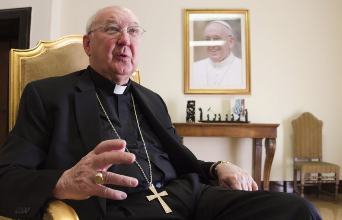Harrisburg Bishop Releases Names of 71 Accused Priests, Deacons, Seminarians
August 3, 2018Canon Lawyer: “Catherine Commissions”– The Immediate Role of the Laity Following Disclosures of Abuse and Predation by Formerly-Cardinal Theodore McCarrick
August 3, 2018
By di Sandro Magister, L’Espresso, August 1, 2018
 As has been known for days, with a terse statement Pope Francis has announced that Theodore McCarrick, 88, archbishop emeritus of Washington, is no longer a cardinal, is under house arrest, must lead a life of prayer and penance, and is suspended “a divinis.” And all this while awaiting the results of the “regular canonical trial.”
As has been known for days, with a terse statement Pope Francis has announced that Theodore McCarrick, 88, archbishop emeritus of Washington, is no longer a cardinal, is under house arrest, must lead a life of prayer and penance, and is suspended “a divinis.” And all this while awaiting the results of the “regular canonical trial.”
One must go back to 1927 to find a previous case of removal from the college of cardinals. That time the one to be stripped of the scarlet was the Jesuit Louis Billot, on account of his allegiance to the political movement “Action Française,” condemned the year before by the Holy See. But for McCarrick the reasons are of a completely different nature and incomparably more serious under the moral profile. They concern his prolonged and disordered sexual activity with adults, young people, and even minors, with priests and seminarians, practiced for decades without having the slightest effect – in spite of the fact that it was known to a great number of persons at various levels of the Church – on his triumphant ecclesiastical career.
Much has already been written about the McCarrick case in recent days. But not much yet on the extent to which it may involve not only the protagonist of the affair, but also the churchmen most closely connected to him, they too the beneficiaries, thanks to him, of careers verging on the miraculous.
One of these in particular prompts serious questions. It is Kevin J. Farrell, 71, made a cardinal by Pope Francis in 2016 and the prefect of the new dicastery for laity, family and life.
Born in Ireland, Farrell entered the Legionaries of Christ in the mid-70’s, when that organization was still small and its malevolent founder Marcial Maciel was shrouded in an aura of universal respectability. After leaving the Legionaries about fifteen years later, Farrell then maintained complete silence over Maciel’s sexual misconduct – dramatically come to light – and has always insisted that he never had any noteworthy contact with him. But it emerges from credible testimonies that he occupied positions in the Legion and enjoyed a more than sporadic proximity to Maciel, which makes it implausible that he was completely unaware of the depraved behavior of his superior.
After leaving the Legion, Farrell was incardinated as a priest of the archdiocese of Washington. And at the end of 2001 he became auxiliary bishop there, when McCarrick had been archbishop for a year.
McCarrick’s promotion as archbishop of the capital of the United States – at the summit of an ascent that had seen him become auxiliary of New York, then bishop of Metuchen, and then archbishop of Newark – had already prompted serious objections back then, motivated precisely by what had already leaked out about his insatiable sexual practices. The objections made it all the way to Rome. But the appointment moved forward all the same, and the following year McCarrick was also made a cardinal.
But the appointment of the Irishman Farrell as his auxiliary caused astonishment too. His previous militancy among the Legionaries of Christ was certainly not set down in his favor, seeing what was starting to leak out about the double life of its founder, Maciel, and about the complicity or the culpable silence of many around him. But by this time McCarrick was a force to be reckoned with, in the upper echelon of the American hierarchy and not only there. He wanted Farrell there with him and he got him, ordaining him bishop personally. And he also wanted him to live in the same apartment with him in Washington, not in the bishop’s residence but on the fourth floor of a former orphanage, conveniently renovated. Once again, it appears implausible that Farrell knew nothing about the ongoing casual sexual adventures of his patron.
In 2006, McCarrick left the archdiocese of Washington for reasons of age, while continuing to exert significant influence in the upper hierarchy of the Church. And the following year Farrell changed sees, promoted as bishop of Dallas, a diocese of the first rank, with the clear support of his mentor.
In the final phase of the pontificate of John Paul II and during the pontificate of Benedict XVI Farrell never stood out among the American cardinals and bishops of progressive stamp. McCarrick did. For example, he was among the critics of the directive given by Joseph Ratzinger to the bishops of the United States to withhold communion from Catholic politicians in favor of the legalization of abortion. And he was an open supporter of one of these “pro-choice” politicians, John Kerry, in the presidential election campaign of 2004.
But after Benedict XVI was replaced by Pope Francis, Farrell also rapidly aligned himself with the new course. In the United States, he immediately teamed up with the new progressive leaders – they too with McCarrick as their patron – Blaise Cupich and Joseph Tobin, promoted by Jorge Mario Bergoglio to Chicago and Newark respectively, both of them also promptly made cardinals. He enthusiastically hailed “Amoris Laetitia” in its interpretation in favor of communion for the divorced and remarried. Above all, having become in the meantime the cardinal prefect of the new Vatican dicastery for laity, family and life, he signed the preface to and recommendation of one of the books most representative of the new Bergoglian climate:
The author, one of the best-known Jesuits in the United States and a leading writer for the magazine “America,” wants this book to open the way to a substantial revision, by the “pastoral” path, of the doctrine of the Catholic Church on homosexuality.
But Cardinal Farrell’s preface to the book is not the only authoritative form of support he has given to this coveted paradigm shift. Farrell, because of the role he now occupies in the curia, is also the official director of the upcoming world meeting of families in Dublin, at the end of August, where Martin will be among the guest speakers, together with homosexual couples from all over the world.
Not to mention Pope Francis’s personal move in this same direction, with the appointment of Martin as an adviser for the new Vatican dicastery for communication, a clear sign of appreciation for this Jesuit’s activity.
Of course, it is easy to charge John Paul II and the Vatican officials of the time with having lacked prudence in promoting to the highest levels a churchman with a notoriously unexemplary life like McCarrick, ignoring all the alarm signals that came to them.
But what seems even more rash is the decision of Pope Francis to call to Rome as head of the dicastery for the family a character like Farrell, who had one after another as his villainous mentors the serial predators Maciel and McCarrick, and moreover presents himself today as a proponent of the legitimization of homosexual amours.
And this is by no means a matter of an isolated case. On the council of 9 cardinals called by Francis to assist him in the “governance of the universal Church,” no fewer than three have been hamstrung on account of sexual abuse:
– the Australian George Pell, on trial in his country;
– the Chilean Francisco Javier Errázuriz Ossa, accused of having defended to the extreme, against all evidence, the serial abuser priest Antonio Karadima and his disciple bishop Juan de la Cruz Barros Madrid, on whose innocence even Pope Francis himself expended all of his authority until the beginning of this year, only to acknowledge his guilt afterward and remove him;
– the Honduran Óscar Andrés Rodríguez Maradiaga, still the coordinator of the “C9” but whose auxiliary bishop and protoge Juan José Pineda was removed last July 20 on account of continuous sexual abuse verified by an apostolic visitation.
But to these must be added not a few churchmen of nonchalant homosexual behavior who populate Bergoglio’s retinue, whom he has wanted close to him on an individual basis: “in primis” that Monsignor Battista Ricca who manages Casa Santa Marta and acts as the official go-between for the pope and the Institute for Works of Religion, the gossip-ridden Vatican “bank.” Having distinguished himself for scandalous conduct when he was a nunciature official in Algiers, in Bern, and even more so in Montevideo, and having been called back to Rome for this reason Ricca saw his personal dossier in the curia rewritten “ex novo” with this record of his expunged, rebuilt his career from the ground up and entered into the good graces of the current pope, who referred to none other than him, at the beginning of his pontificate, with that famous phrase: “Who am I to judge?” which has become a universal byword.
(English translation by Matthew Sherry, Ballwin, Missouri, U.S.A.)





 As has been known for days, with a terse
As has been known for days, with a terse 

